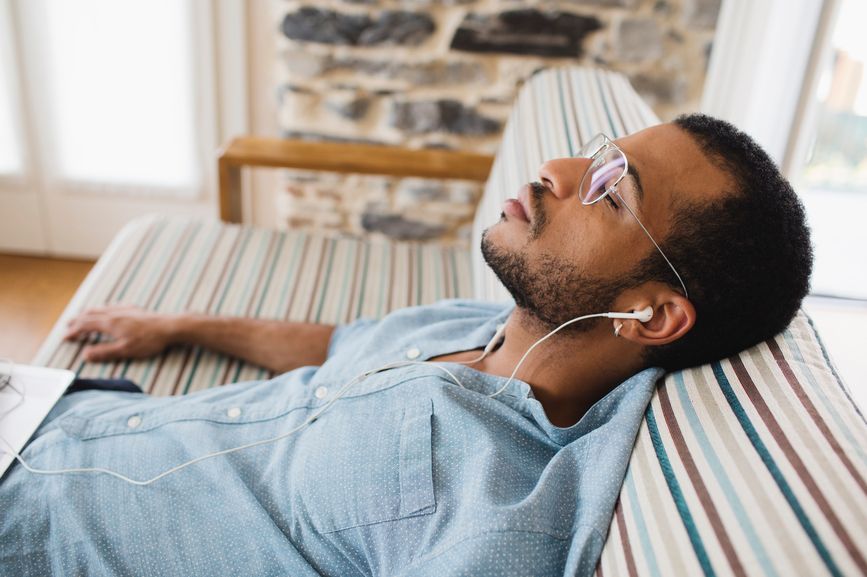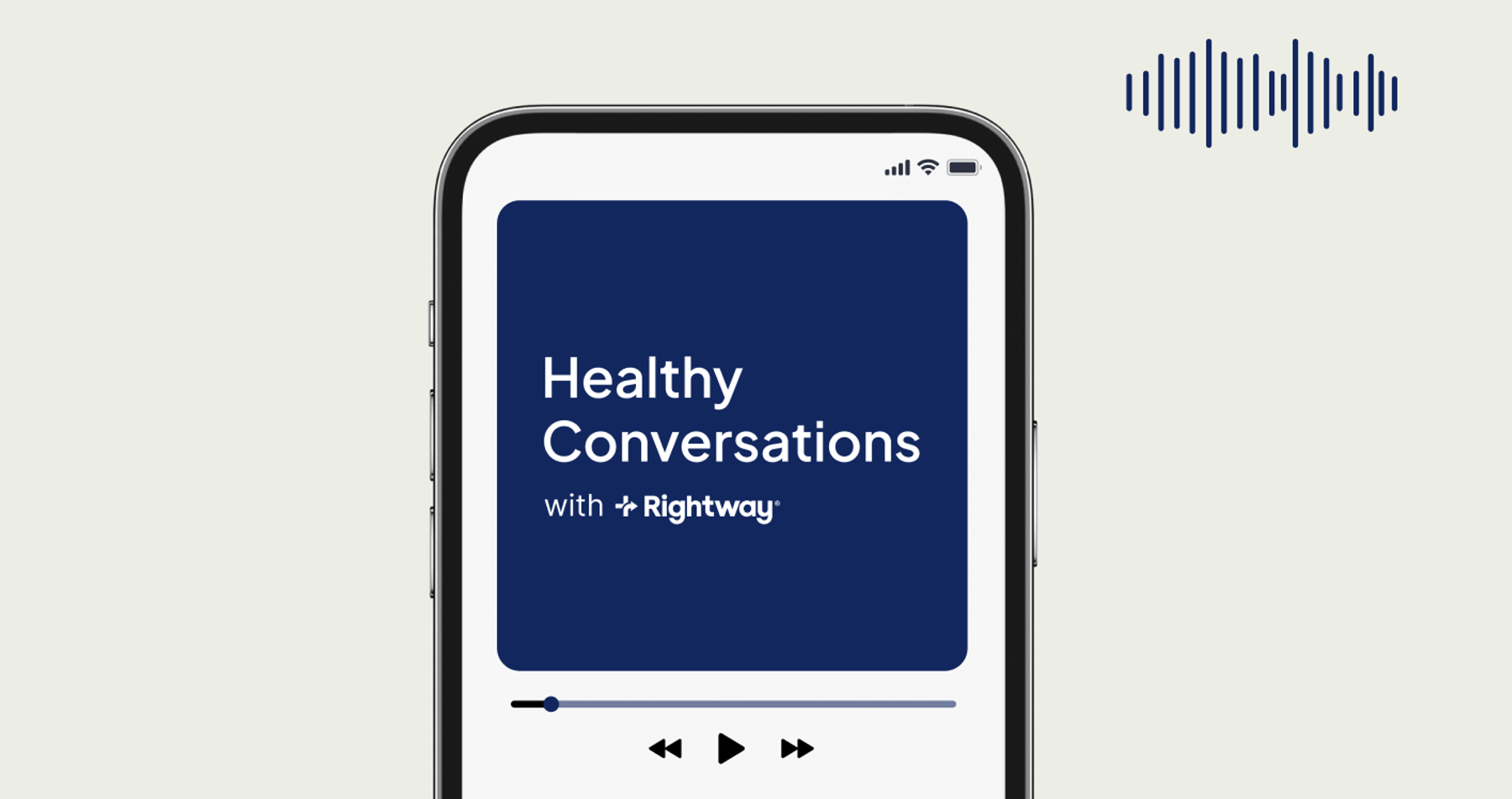8 ways to lower stress and anxiety in minutes.

It probably comes as no surprise that stress and anxiety have been on the rise worldwide. Let’s take a closer look at what it means to experience these feelings and science-backed tips to help you feel your best.
What’s the difference between stress and anxiety?
While we tend to label it as a negative feeling, broadly speaking, stress refers to how the body reacts in response to any kind of tension(1). Stress can sometimes be a good thing—when you’re in danger, your stress response enables you to act quickly to get to safety. But if you experience stress regularly, it can take a toll on your mental, emotional, and even physical health.
Similarly, anxiety also involves excessive worry and tension(2). It’s different from stress in that anxiousness may arise whether or not there is a stressor. More often than not, anxiety surfaces in response to internal triggers, like intrusive thoughts(3).
Given their similarities, symptoms of stress and anxiety can be hard to tell apart. Some overlapping signs include:
- Fatigue
- Irritability
- Lack of focus
- Sleep problems, like insomnia
- Muscle tension, headaches, or stomach pain
Keep in mind that feeling anxious and having an anxiety disorder are different(4). If you’ve been experiencing stress, anxiousness, and other unpleasant emotions for a long period of time, it’s a good idea to reach out to a mental health professional. They can help you determine if you have an anxiety disorder and come up with a treatment plan to reduce symptoms and their impact on your daily routine.
Effective strategies to reduce stress and anxiety.
Even if you don't have much free time, you can try many different stress and anxiety management techniques that are free and only take a few minutes to practice.
1. Write down your feelings.
From improving cognitive function to social interactions, writing down your emotions can help you process them better and serve as a healthy coping strategy(5). Simply describing what you’re feeling may help you accept them instead of judging them and help you navigate your next steps in a calmer frame of mind.
While many studies seem to show positive health outcomes of writing(6), some seem to indicate that writing about traumatic events may increase worry and anxiety(7). But more studies with larger sample sizes are needed to confirm writing as a tool to combat anxiety.
2. Name negative emotions.
You might have heard this in the context of fear, which is closely linked to both stress and anxiety. In fact, stress and anxiety is often a result of a fear of an event or the future.
Giving your emotion a name can make it seem more human and approachable rather than a feeling to turn away from or block(8). Going a step further, and looking at fear, stress, or anxiety your ally, can help you clue into why these feelings might be coming up.
3. Listen to your favorite song.
Taking the time you need to feel your emotions is important — and though at times, that may mean choosing a playlist that reflects your current mood, listening to a song that uplifts or energizes you can help you shake off some of the worry. Just as research has shown classical music to have a calming effect, enabling people to focus on certain tasks, many studies show music therapy to be an effective tool in stress reduction(9).
4. Do a 2-minute breathing exercise.
As effective as they are, meditation and mindfulness exercises can be difficult to incorporate into your routine, as they’re best done with time, a quiet space, and focus. The good news is, just a couple of minutes of deep breathing can be enough to shift your awareness from things that are causing you stress and anxiety to your breath.
The 4-7-8 method is one of many breathing exercises you can try(10). Inhale through your nose for four counts, hold your breath for 7 counts, and exhale from your mouth for 8 counts. Slow, controlled breathing activates the parasympathetic system, or the part of your body that helps it rest(11).
5. Go for a 5-minute walk.
Outdoors in the fresh air is ideal for a walk, but if there are constraints, taking a break to take a quick lap wherever you are can get your blood moving and help you clear your mind(12). With work often being a source of stress for many, a simple habit like this can help boost productivity, while releasing endorphins, which are known to improve mood. Plus, you get a change of scene which is beneficial to help clear your mind.
6. Call a loved one.
Having a community to turn to — whether that’s friends, family, work colleagues, classmates, a recreational team, a faith-based group — is also an effective way to lower stress and anxiety(13). If meeting face-to-face is not an option, a phone or video call with a loved one can be uplifting. Whether you’re looking for advice or simply someone who can listen to you and support you, a quick call can be enough to blow off steam.
7. Recount your best success story.
If your stress or anxiety is performance-related (i.e. work, sports, or otherwise), think of a past success, where you overcame a hurdle and achieved a goal you’re proud of. Write this down on a post-it or note card and keep it handy. This way, when you’re in a similar situation and need a confidence boost and a way to quell your fear, you can remind yourself of your capabilities.
Among many results, scientists found that people who seek positive memories had a lower spike in cortisol levels (stress hormone) and reported better mood(14).
8. Try a quick puzzle.
Mini crossword, KenKen, Sudoko — there are many games available in newspapers, online, and on mobile apps that you can turn to for a healthy break. Not only that, but with the focus and attention needed to solve these puzzles, you’re less likely to think of troubling things. Even if these take long to complete, spending a few minutes on a game or puzzle can help you channel your focus away from stressors(15).
Other practices to provide long-term stress and anxiety relief.
Remember, this isn’t an exhaustive list of ways to combat stress, and not every technique will work for everyone. To know whether a particular strategy is helpful, you may need to be consistent with it before you notice any difference. In fact, while scientists have found strategies like yoga and mindfulness to be effective in helping people feel more relaxed and even experience more health benefits, larger studies and personalized approaches to stress reduction are needed(16).
That said, long-term lifestyle changes— like eating nutritious foods, exercising regularly, and getting enough (and restful!) sleep — goes a long way in improving your ability to handle and overcome stress, anxiety, and other unhelpful emotions and behaviors(17).
What to do if you’re constantly stressed or anxious.
If you have tried out these tips and not seen any major difference, or find that you’re still in a state of constant stress or anxiety, it may be time to seek help. And while finding the right care can be time-consuming and confusing, don’t forget that with Rightway, your health guide takes care of everything: from provider searching to appointment setting and beyond, we’ve got you covered.
Download the Rightway app and connect with a health guide today if you have any questions or need support.
Sources:
(1) MedlinePlus. (2022). Stress and your health.
(2) American Psychological Association. (2022). What’s the difference between stress and anxiety?.
(3) Harvard Business Review. (2021). Am I anxious or just stressed?.
(4) MedlinePlus. (2020). Anxiety.
(5) Tonarelli, A., et al. (2017). Expressive writing: a tool to help health workers — research project on the benefits of expressive writing. Acta Biomedica.
(6) CSRWire. (2020). Expressive writing is good for your mental health.
(7) Niles, A. N., et al. (2014). Effects of expressive writing on psychological and physical health: The moderating role of emotional expressivity. Anxiety Stress Coping.
(8) Lieberman, M. D., et al. (2011). Subjective responses to emotional stimuli during labeling, reappraisal, and distraction. American Psychological Association.
(9) De Witte, M., et al. (2020). Effects of music interventions on stress-related outcomes: A systematic review and two meta-analyses. Health Psychology Review.
(10) CNN Health. (2022). The 4-7-8 method that could help you sleep.
(11) Naik, G. S., et al. (2018). Effect of modified slow breathing exercise on perceived stress and basal cardiovascular parameters. International Journal of Yoga.
(12) American Heart Association. (2018). Spend time in nature to reduce stress and anxiety.
(13) Martino, J., et al. (2017). The connection prescription: Using the power of social interactions and the deep desire for connectedness to empower health and wellness. American Journal of Lifestyle Medicine.
(14) Speer, M. E., et al. (2017). Reminiscing about positive memories buffers acute stress responses. Nature Human Behavior.
(15) Forbes. (2020). Help workers combat stress and anxiety with games.
(16) Can, Y. S., et al. (2020). How to relax in stressful situations: A smart stress reduction system. Healthcare
(17) Health.gov. (2022). Manage stress







